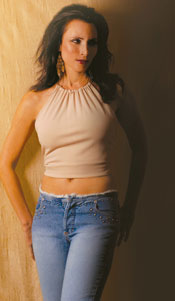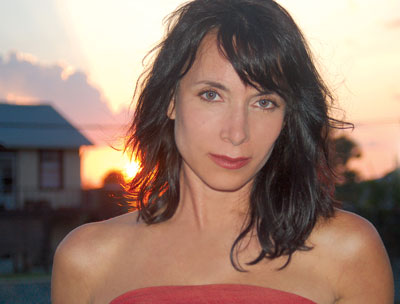
Brenda David
Kyrby Raine

Singer/songwriter Brenda David is no newcomer, but it took her eight years to release her first album, Scratch, in 1998. However, what genre David belongs in remains an unsolved puzzle. Unafraid of pop experimentation (the genre-leaping kind), David shape shifts so much on her new LP, Better Part of Me, that you might get whiplash. But unpredictable artists generate the most excitement, and David was kind enough to try to explain her chameleon ways.
You’ve been around since 1989 yet your current music, at least the Better Part of Me CD, isn’t rooted stylistically in any time period. How have you been able to stay active playing music all these years and continue to pursue various genres without being tempted to stick to a formula?
There was a time in the beginning of my music career when I was pushed by others to sing cover songs that didn’t necessarily flatter my vocal style and simply didn’t appeal to me musically. That drove me to want to learn how to play guitar and write my own songs. I am far more inspired when I play and sing my own material as opposed to doing covers. My favorite way to perform is as a solo guitarist, and my performances are just like my records. I go from country to blues to Adult Contemporary in 30 minutes but somehow it all flows and people love it. I think that what I do is take these different styles and sprinkle a little bit of myself on top and that’s what makes it all sound cohesive. It seems to appeal to a wide range of people. Also, I use a lot of strategic planning in the placement of the songs next to each other. There’s some underlying invisible string that ties each song together. There’s too much to explore musically to try to stick to one formula…to me that would be more contrived than just going where I think the song lends itself.
There’s jazz, Adult Contemporary, and college rock on your album, but it’s “Behind the Veil,” with its Middle Eastern touches and sociopolitical lyrics about Muslim women that I find most intriguing. What’s the story behind the tale?
I wrote “Behind the Veil” in 1999, before 9/11 and all that followed. I received an email from someone that described what the women of Afghanistan were enduring and how the world seemed to be ignoring their situation. I was so moved by the story of how women who had been doctors and lawyers and mothers and teachers were then being isolated in their own homes, not allowed to make a sound, or learn, or go out in public, or show any part of their skin without being beaten or stoned. I saw pictures of them in their burquas and thought that could be me and my sister and my mom if we had the misfortune to be born in Afghanistan. I wrote that song and started playing it at some of my gigs and always people would come to ask me about the lyrics. It really moved a lot of people to understand what was happening over there. I don’t typically write political songs, but that one truly just wrote itself. I think what makes it unique is that it ties us all to the situation. We are all brothers and sisters on this planet and we can’t ignore what’s going on in another part of the world just because it doesn’t seem to be affecting us directly. As we learned, it all affects each of us.
When you write a song, do you think, “Oh, here’s my country tune,” or “This will be the perfect jazz track.” Are you self-conscious of it or does it flow naturally?
I typically write songs on my acoustic guitar. Believe it or not they all sound pretty similar in the beginning stages when it’s just me and my guitar. Just ask my dog Kelsey – she’s the only one who hears them at that stage! It’s when we get into the studio that they start to morph and take shape into a distinct flavor. The song usually tells me which direction it wants to go. I have amazing musicians who come in and we might try a lot of different tempos and/or instruments before we hit on the right thing but once we do everbody knows it. All of a sudden it feels comfortable, like an old bathrobe. You just know when it’s right. Even if it becomes a heavy metal polka, I try to take it where it feels comfortable and at home!

You’ve been quite successful in Europe. How did you acquire a following there?
Right after I released Scratch I began to receive a lot of radio play throughout Europe and Africa. Scratch had huge success on the overseas radio market, especially in Europe and Africa. I toured Africa, performing all original music backed by amazing African musicians. It was an incredible experience! The overseas market is a wonderful resource, especially for independent and small label artists. Often in the U.S., commercial radio stations dictate what gets played by the Billboard charts and being signed by a major label. The overseas market is wide open to independents and you can have commercial airplay right alongside major label artists. Recording and releasing a cd is only the first, very small step in the process. There are countless hours of work that go into the marketing and distribution process in order to take your music to the world. I’m privileged to have great representation through Sutton Publicity and I’m also thrilled to be represented in the Philippines through Mondo Distribution and in Africa through Uchman Concepts International. We have plans underway for performances in Africa in the spring.












